Educator Support & Theories in Cognitive Development of Young Children
VerifiedAdded on 2023/06/07
|7
|1368
|371
Essay
AI Summary
This essay explores the crucial role of educators in supporting the cognitive development of infants and young children across various age groups, from infancy to 8 years old. It details specific strategies educators can employ, such as providing interactive objects for infants, play materials for toddlers, and problem-solving activities for older children. The essay also provides brief explanations of key child development theories, including Piaget's cognitive theory, Freud's psychoanalytic theory, Pavlov's behaviorist theory, Bronfenbrenner's ecological theory, and Darwin's biological theory, highlighting how these frameworks inform educational practices. The conclusion emphasizes the significance of fostering cognitive development in early childhood to shape future thinking and behavior, advocating for caregivers to create supportive environments.
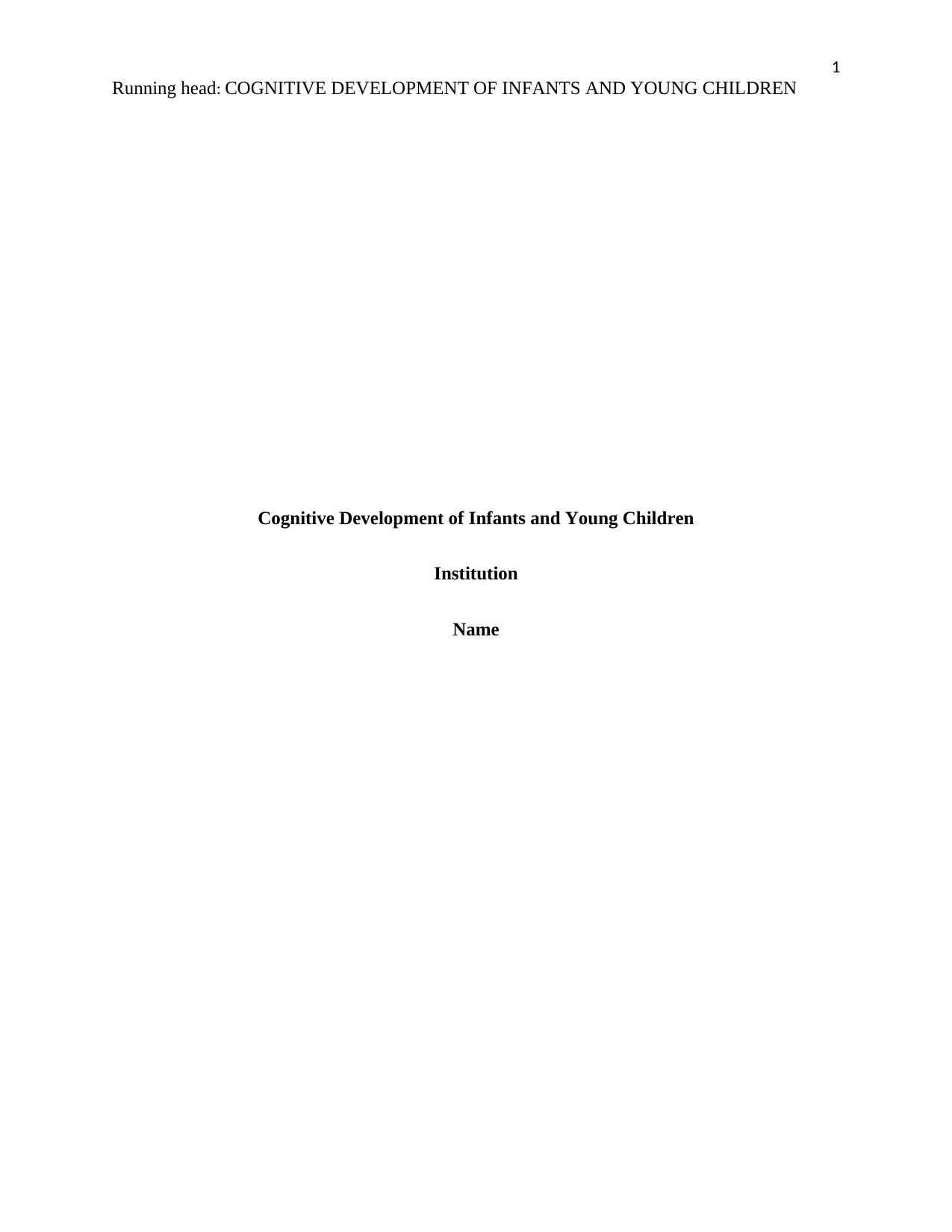
1
Running head: COGNITIVE DEVELOPMENT OF INFANTS AND YOUNG CHILDREN
Cognitive Development of Infants and Young Children
Institution
Name
Running head: COGNITIVE DEVELOPMENT OF INFANTS AND YOUNG CHILDREN
Cognitive Development of Infants and Young Children
Institution
Name
Paraphrase This Document
Need a fresh take? Get an instant paraphrase of this document with our AI Paraphraser
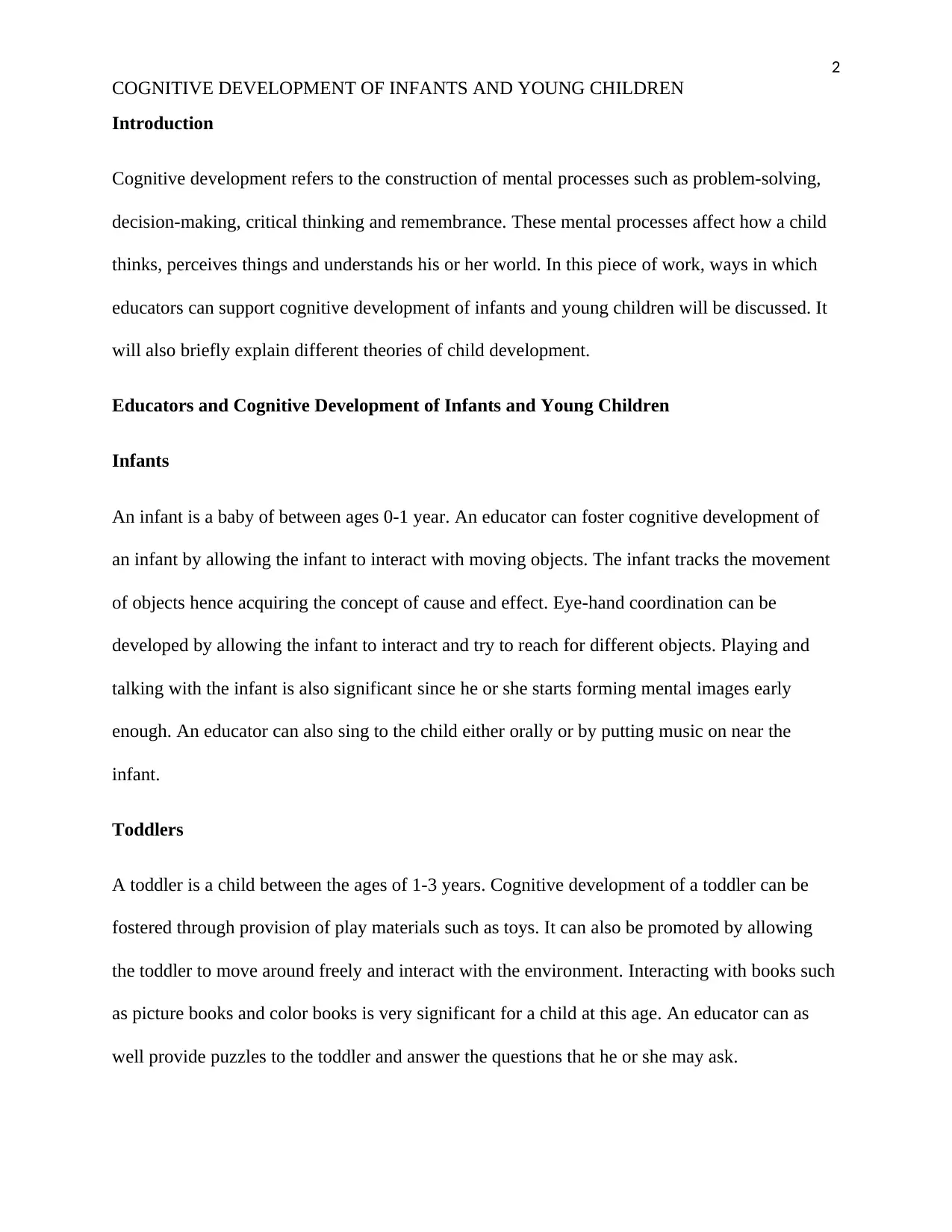
2
COGNITIVE DEVELOPMENT OF INFANTS AND YOUNG CHILDREN
Introduction
Cognitive development refers to the construction of mental processes such as problem-solving,
decision-making, critical thinking and remembrance. These mental processes affect how a child
thinks, perceives things and understands his or her world. In this piece of work, ways in which
educators can support cognitive development of infants and young children will be discussed. It
will also briefly explain different theories of child development.
Educators and Cognitive Development of Infants and Young Children
Infants
An infant is a baby of between ages 0-1 year. An educator can foster cognitive development of
an infant by allowing the infant to interact with moving objects. The infant tracks the movement
of objects hence acquiring the concept of cause and effect. Eye-hand coordination can be
developed by allowing the infant to interact and try to reach for different objects. Playing and
talking with the infant is also significant since he or she starts forming mental images early
enough. An educator can also sing to the child either orally or by putting music on near the
infant.
Toddlers
A toddler is a child between the ages of 1-3 years. Cognitive development of a toddler can be
fostered through provision of play materials such as toys. It can also be promoted by allowing
the toddler to move around freely and interact with the environment. Interacting with books such
as picture books and color books is very significant for a child at this age. An educator can as
well provide puzzles to the toddler and answer the questions that he or she may ask.
COGNITIVE DEVELOPMENT OF INFANTS AND YOUNG CHILDREN
Introduction
Cognitive development refers to the construction of mental processes such as problem-solving,
decision-making, critical thinking and remembrance. These mental processes affect how a child
thinks, perceives things and understands his or her world. In this piece of work, ways in which
educators can support cognitive development of infants and young children will be discussed. It
will also briefly explain different theories of child development.
Educators and Cognitive Development of Infants and Young Children
Infants
An infant is a baby of between ages 0-1 year. An educator can foster cognitive development of
an infant by allowing the infant to interact with moving objects. The infant tracks the movement
of objects hence acquiring the concept of cause and effect. Eye-hand coordination can be
developed by allowing the infant to interact and try to reach for different objects. Playing and
talking with the infant is also significant since he or she starts forming mental images early
enough. An educator can also sing to the child either orally or by putting music on near the
infant.
Toddlers
A toddler is a child between the ages of 1-3 years. Cognitive development of a toddler can be
fostered through provision of play materials such as toys. It can also be promoted by allowing
the toddler to move around freely and interact with the environment. Interacting with books such
as picture books and color books is very significant for a child at this age. An educator can as
well provide puzzles to the toddler and answer the questions that he or she may ask.
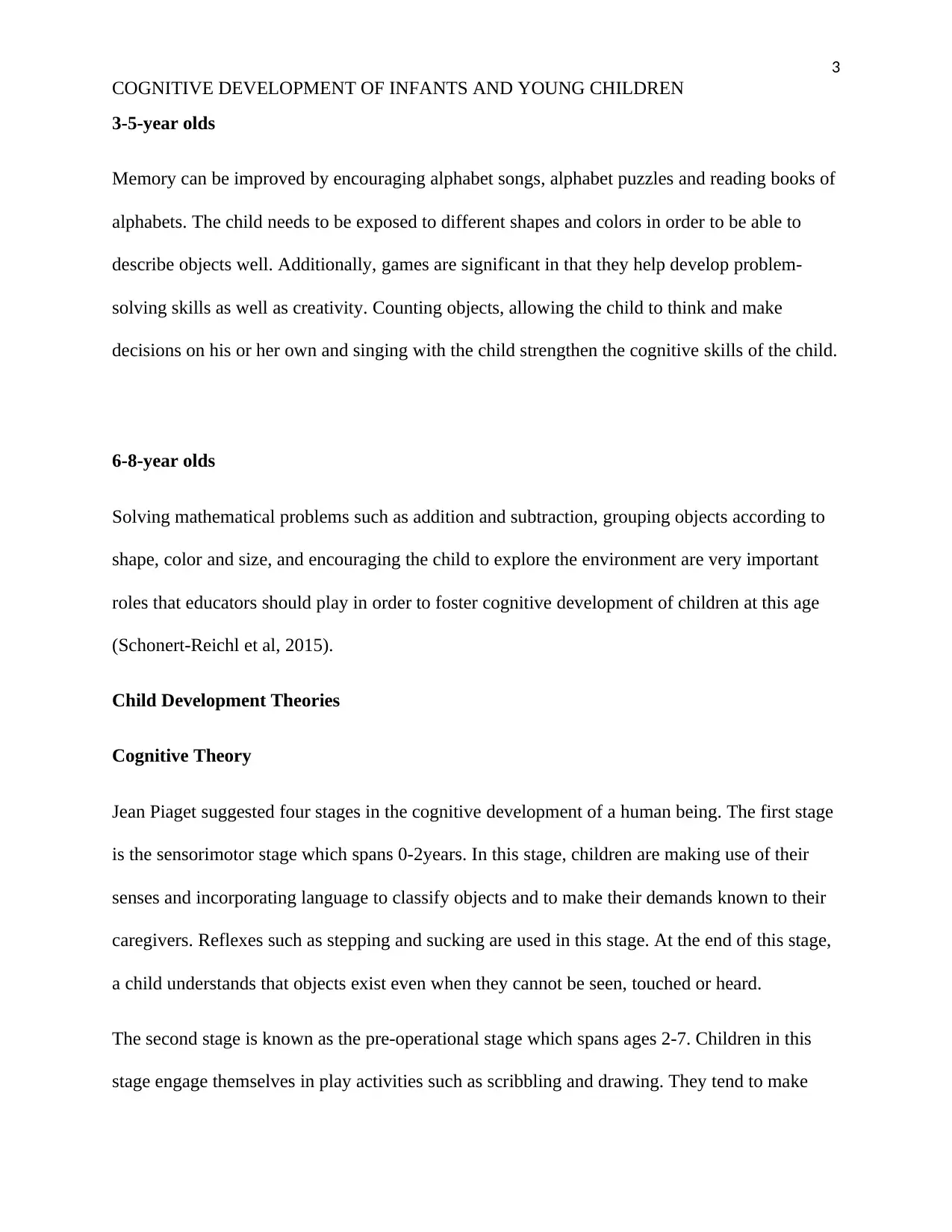
3
COGNITIVE DEVELOPMENT OF INFANTS AND YOUNG CHILDREN
3-5-year olds
Memory can be improved by encouraging alphabet songs, alphabet puzzles and reading books of
alphabets. The child needs to be exposed to different shapes and colors in order to be able to
describe objects well. Additionally, games are significant in that they help develop problem-
solving skills as well as creativity. Counting objects, allowing the child to think and make
decisions on his or her own and singing with the child strengthen the cognitive skills of the child.
6-8-year olds
Solving mathematical problems such as addition and subtraction, grouping objects according to
shape, color and size, and encouraging the child to explore the environment are very important
roles that educators should play in order to foster cognitive development of children at this age
(Schonert-Reichl et al, 2015).
Child Development Theories
Cognitive Theory
Jean Piaget suggested four stages in the cognitive development of a human being. The first stage
is the sensorimotor stage which spans 0-2years. In this stage, children are making use of their
senses and incorporating language to classify objects and to make their demands known to their
caregivers. Reflexes such as stepping and sucking are used in this stage. At the end of this stage,
a child understands that objects exist even when they cannot be seen, touched or heard.
The second stage is known as the pre-operational stage which spans ages 2-7. Children in this
stage engage themselves in play activities such as scribbling and drawing. They tend to make
COGNITIVE DEVELOPMENT OF INFANTS AND YOUNG CHILDREN
3-5-year olds
Memory can be improved by encouraging alphabet songs, alphabet puzzles and reading books of
alphabets. The child needs to be exposed to different shapes and colors in order to be able to
describe objects well. Additionally, games are significant in that they help develop problem-
solving skills as well as creativity. Counting objects, allowing the child to think and make
decisions on his or her own and singing with the child strengthen the cognitive skills of the child.
6-8-year olds
Solving mathematical problems such as addition and subtraction, grouping objects according to
shape, color and size, and encouraging the child to explore the environment are very important
roles that educators should play in order to foster cognitive development of children at this age
(Schonert-Reichl et al, 2015).
Child Development Theories
Cognitive Theory
Jean Piaget suggested four stages in the cognitive development of a human being. The first stage
is the sensorimotor stage which spans 0-2years. In this stage, children are making use of their
senses and incorporating language to classify objects and to make their demands known to their
caregivers. Reflexes such as stepping and sucking are used in this stage. At the end of this stage,
a child understands that objects exist even when they cannot be seen, touched or heard.
The second stage is known as the pre-operational stage which spans ages 2-7. Children in this
stage engage themselves in play activities such as scribbling and drawing. They tend to make
⊘ This is a preview!⊘
Do you want full access?
Subscribe today to unlock all pages.

Trusted by 1+ million students worldwide
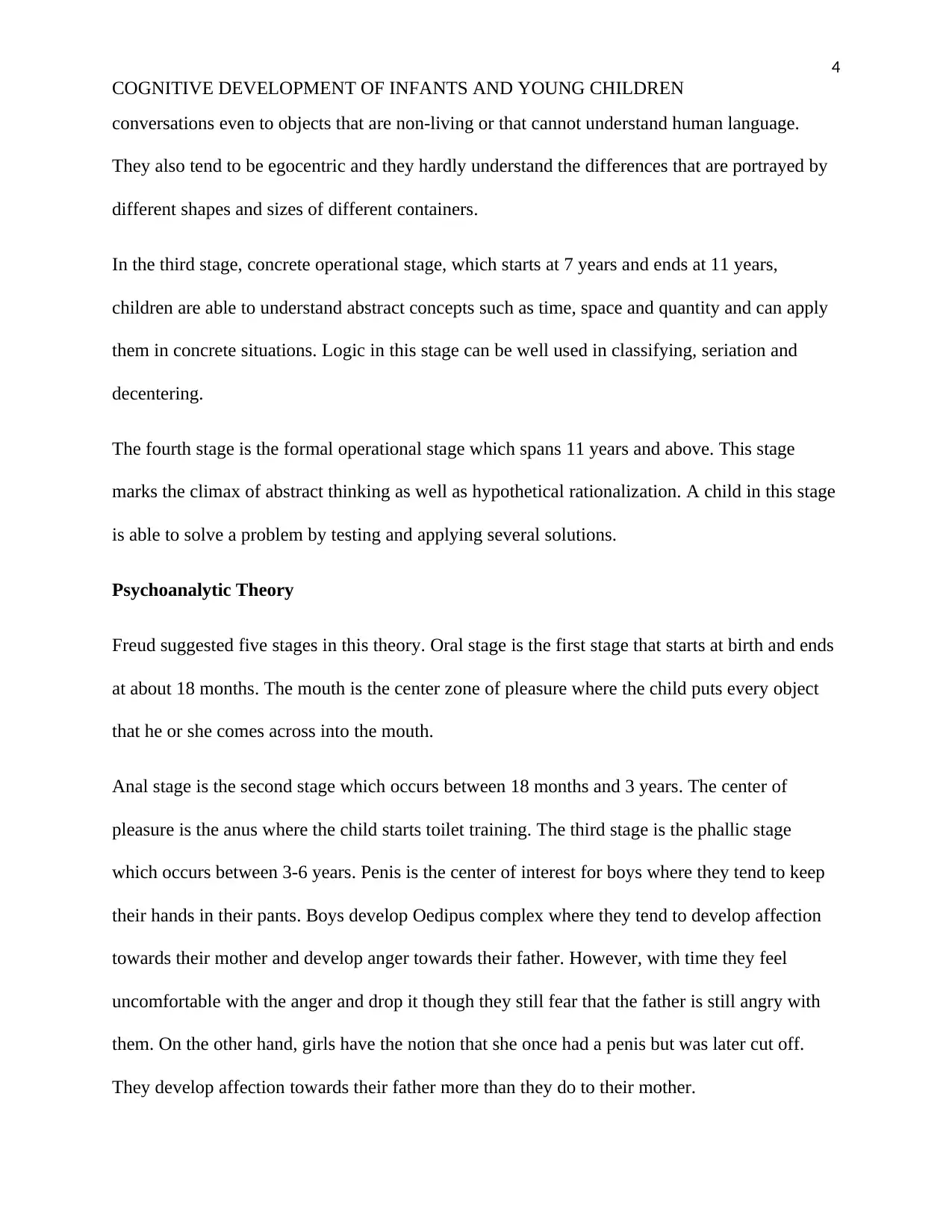
4
COGNITIVE DEVELOPMENT OF INFANTS AND YOUNG CHILDREN
conversations even to objects that are non-living or that cannot understand human language.
They also tend to be egocentric and they hardly understand the differences that are portrayed by
different shapes and sizes of different containers.
In the third stage, concrete operational stage, which starts at 7 years and ends at 11 years,
children are able to understand abstract concepts such as time, space and quantity and can apply
them in concrete situations. Logic in this stage can be well used in classifying, seriation and
decentering.
The fourth stage is the formal operational stage which spans 11 years and above. This stage
marks the climax of abstract thinking as well as hypothetical rationalization. A child in this stage
is able to solve a problem by testing and applying several solutions.
Psychoanalytic Theory
Freud suggested five stages in this theory. Oral stage is the first stage that starts at birth and ends
at about 18 months. The mouth is the center zone of pleasure where the child puts every object
that he or she comes across into the mouth.
Anal stage is the second stage which occurs between 18 months and 3 years. The center of
pleasure is the anus where the child starts toilet training. The third stage is the phallic stage
which occurs between 3-6 years. Penis is the center of interest for boys where they tend to keep
their hands in their pants. Boys develop Oedipus complex where they tend to develop affection
towards their mother and develop anger towards their father. However, with time they feel
uncomfortable with the anger and drop it though they still fear that the father is still angry with
them. On the other hand, girls have the notion that she once had a penis but was later cut off.
They develop affection towards their father more than they do to their mother.
COGNITIVE DEVELOPMENT OF INFANTS AND YOUNG CHILDREN
conversations even to objects that are non-living or that cannot understand human language.
They also tend to be egocentric and they hardly understand the differences that are portrayed by
different shapes and sizes of different containers.
In the third stage, concrete operational stage, which starts at 7 years and ends at 11 years,
children are able to understand abstract concepts such as time, space and quantity and can apply
them in concrete situations. Logic in this stage can be well used in classifying, seriation and
decentering.
The fourth stage is the formal operational stage which spans 11 years and above. This stage
marks the climax of abstract thinking as well as hypothetical rationalization. A child in this stage
is able to solve a problem by testing and applying several solutions.
Psychoanalytic Theory
Freud suggested five stages in this theory. Oral stage is the first stage that starts at birth and ends
at about 18 months. The mouth is the center zone of pleasure where the child puts every object
that he or she comes across into the mouth.
Anal stage is the second stage which occurs between 18 months and 3 years. The center of
pleasure is the anus where the child starts toilet training. The third stage is the phallic stage
which occurs between 3-6 years. Penis is the center of interest for boys where they tend to keep
their hands in their pants. Boys develop Oedipus complex where they tend to develop affection
towards their mother and develop anger towards their father. However, with time they feel
uncomfortable with the anger and drop it though they still fear that the father is still angry with
them. On the other hand, girls have the notion that she once had a penis but was later cut off.
They develop affection towards their father more than they do to their mother.
Paraphrase This Document
Need a fresh take? Get an instant paraphrase of this document with our AI Paraphraser
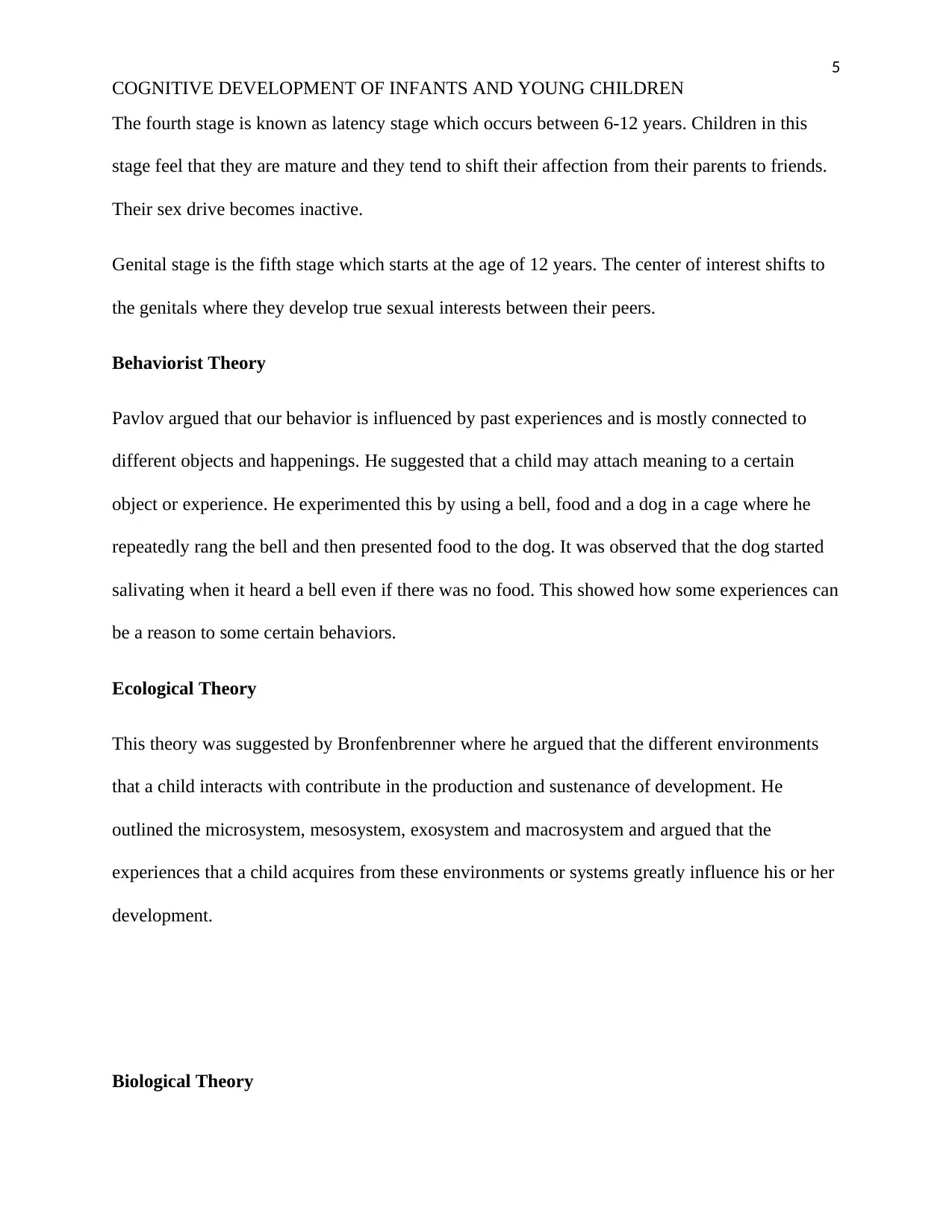
5
COGNITIVE DEVELOPMENT OF INFANTS AND YOUNG CHILDREN
The fourth stage is known as latency stage which occurs between 6-12 years. Children in this
stage feel that they are mature and they tend to shift their affection from their parents to friends.
Their sex drive becomes inactive.
Genital stage is the fifth stage which starts at the age of 12 years. The center of interest shifts to
the genitals where they develop true sexual interests between their peers.
Behaviorist Theory
Pavlov argued that our behavior is influenced by past experiences and is mostly connected to
different objects and happenings. He suggested that a child may attach meaning to a certain
object or experience. He experimented this by using a bell, food and a dog in a cage where he
repeatedly rang the bell and then presented food to the dog. It was observed that the dog started
salivating when it heard a bell even if there was no food. This showed how some experiences can
be a reason to some certain behaviors.
Ecological Theory
This theory was suggested by Bronfenbrenner where he argued that the different environments
that a child interacts with contribute in the production and sustenance of development. He
outlined the microsystem, mesosystem, exosystem and macrosystem and argued that the
experiences that a child acquires from these environments or systems greatly influence his or her
development.
Biological Theory
COGNITIVE DEVELOPMENT OF INFANTS AND YOUNG CHILDREN
The fourth stage is known as latency stage which occurs between 6-12 years. Children in this
stage feel that they are mature and they tend to shift their affection from their parents to friends.
Their sex drive becomes inactive.
Genital stage is the fifth stage which starts at the age of 12 years. The center of interest shifts to
the genitals where they develop true sexual interests between their peers.
Behaviorist Theory
Pavlov argued that our behavior is influenced by past experiences and is mostly connected to
different objects and happenings. He suggested that a child may attach meaning to a certain
object or experience. He experimented this by using a bell, food and a dog in a cage where he
repeatedly rang the bell and then presented food to the dog. It was observed that the dog started
salivating when it heard a bell even if there was no food. This showed how some experiences can
be a reason to some certain behaviors.
Ecological Theory
This theory was suggested by Bronfenbrenner where he argued that the different environments
that a child interacts with contribute in the production and sustenance of development. He
outlined the microsystem, mesosystem, exosystem and macrosystem and argued that the
experiences that a child acquires from these environments or systems greatly influence his or her
development.
Biological Theory
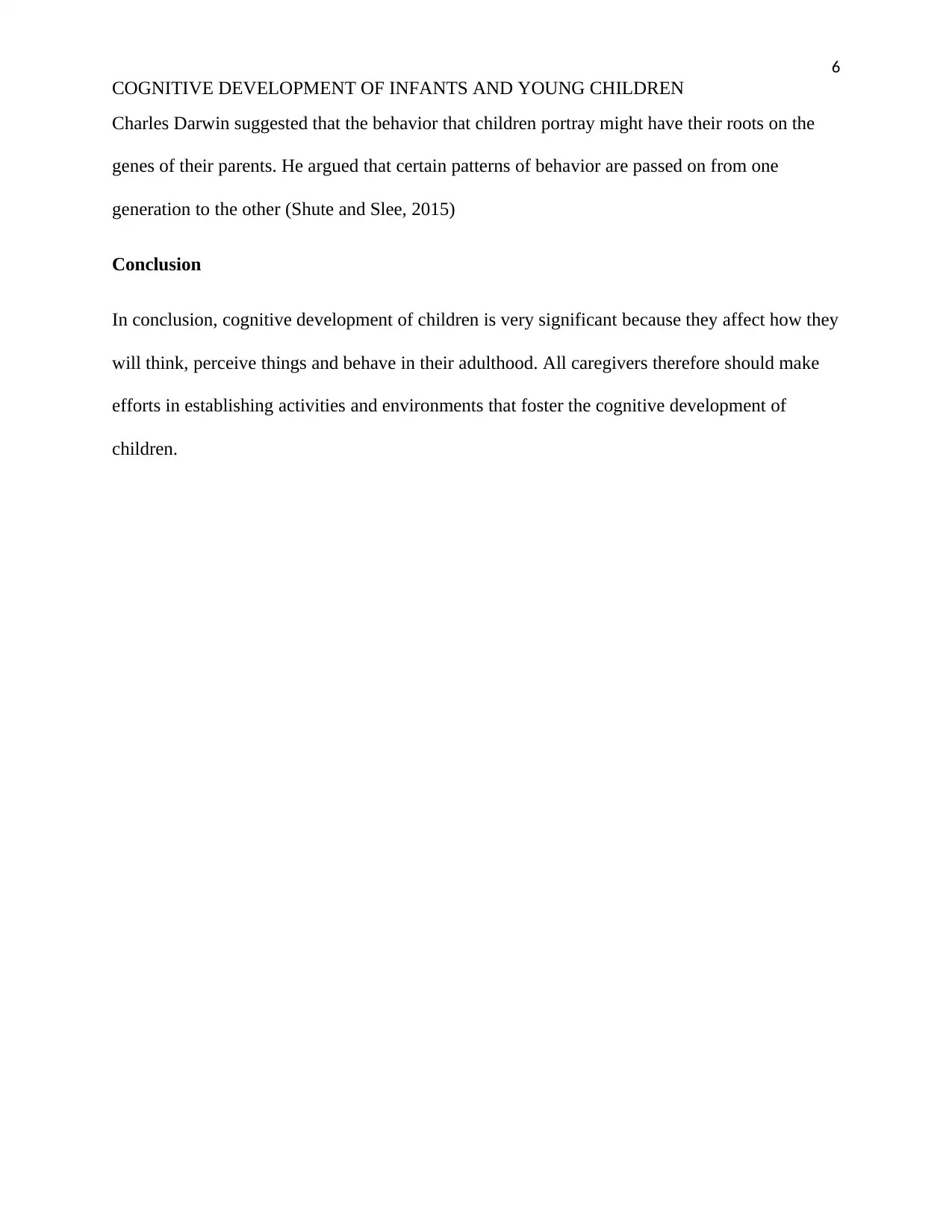
6
COGNITIVE DEVELOPMENT OF INFANTS AND YOUNG CHILDREN
Charles Darwin suggested that the behavior that children portray might have their roots on the
genes of their parents. He argued that certain patterns of behavior are passed on from one
generation to the other (Shute and Slee, 2015)
Conclusion
In conclusion, cognitive development of children is very significant because they affect how they
will think, perceive things and behave in their adulthood. All caregivers therefore should make
efforts in establishing activities and environments that foster the cognitive development of
children.
COGNITIVE DEVELOPMENT OF INFANTS AND YOUNG CHILDREN
Charles Darwin suggested that the behavior that children portray might have their roots on the
genes of their parents. He argued that certain patterns of behavior are passed on from one
generation to the other (Shute and Slee, 2015)
Conclusion
In conclusion, cognitive development of children is very significant because they affect how they
will think, perceive things and behave in their adulthood. All caregivers therefore should make
efforts in establishing activities and environments that foster the cognitive development of
children.
⊘ This is a preview!⊘
Do you want full access?
Subscribe today to unlock all pages.

Trusted by 1+ million students worldwide
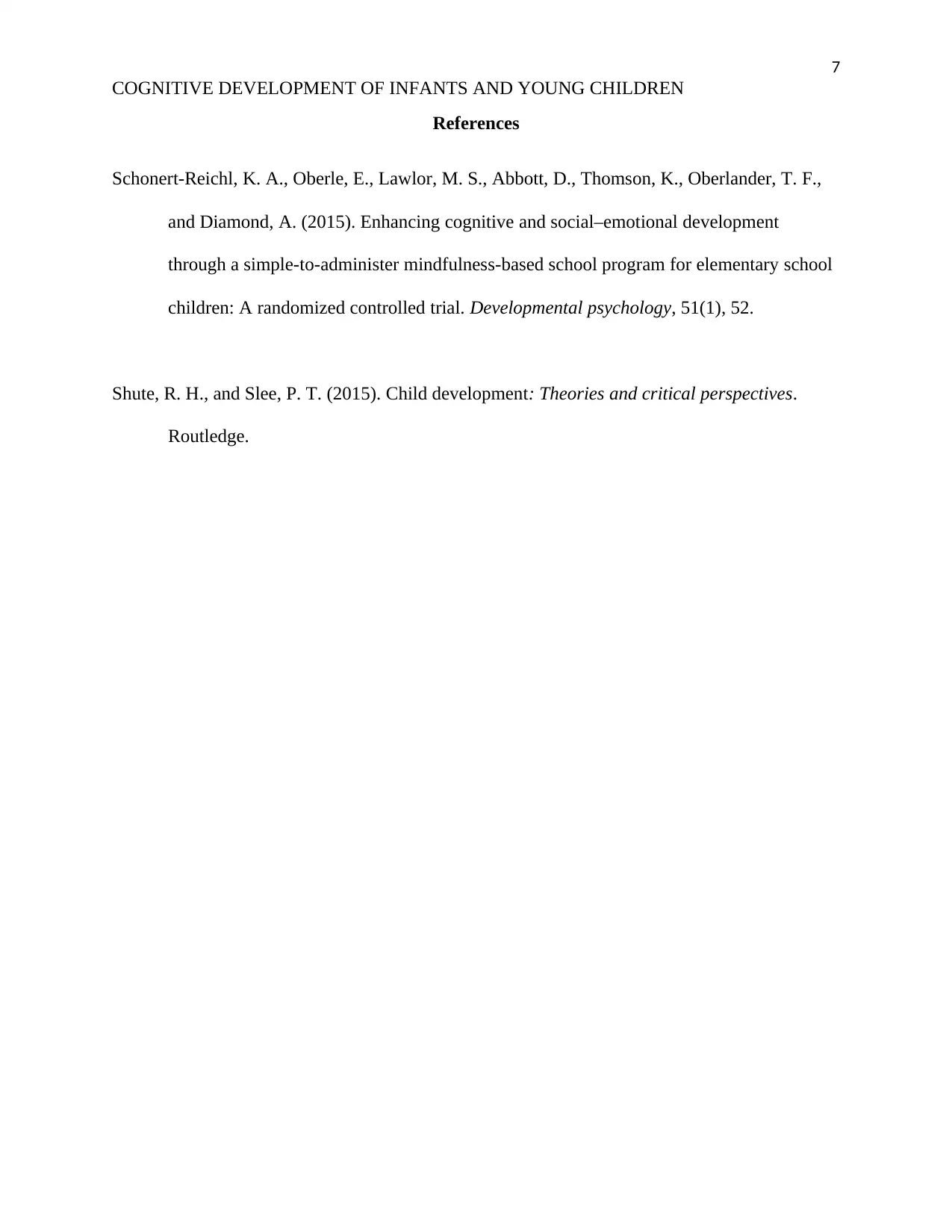
7
COGNITIVE DEVELOPMENT OF INFANTS AND YOUNG CHILDREN
References
Schonert-Reichl, K. A., Oberle, E., Lawlor, M. S., Abbott, D., Thomson, K., Oberlander, T. F.,
and Diamond, A. (2015). Enhancing cognitive and social–emotional development
through a simple-to-administer mindfulness-based school program for elementary school
children: A randomized controlled trial. Developmental psychology, 51(1), 52.
Shute, R. H., and Slee, P. T. (2015). Child development: Theories and critical perspectives.
Routledge.
COGNITIVE DEVELOPMENT OF INFANTS AND YOUNG CHILDREN
References
Schonert-Reichl, K. A., Oberle, E., Lawlor, M. S., Abbott, D., Thomson, K., Oberlander, T. F.,
and Diamond, A. (2015). Enhancing cognitive and social–emotional development
through a simple-to-administer mindfulness-based school program for elementary school
children: A randomized controlled trial. Developmental psychology, 51(1), 52.
Shute, R. H., and Slee, P. T. (2015). Child development: Theories and critical perspectives.
Routledge.
1 out of 7
Related Documents
Your All-in-One AI-Powered Toolkit for Academic Success.
+13062052269
info@desklib.com
Available 24*7 on WhatsApp / Email
![[object Object]](/_next/static/media/star-bottom.7253800d.svg)
Unlock your academic potential
Copyright © 2020–2026 A2Z Services. All Rights Reserved. Developed and managed by ZUCOL.





